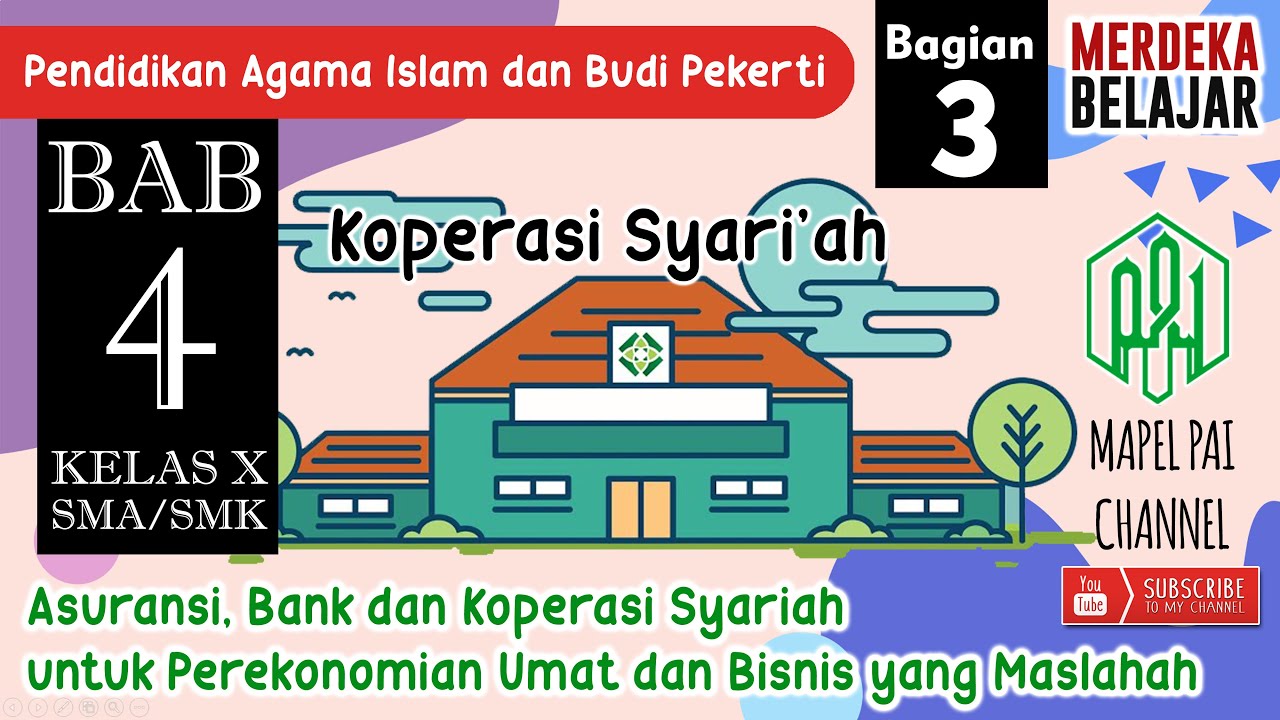Hijrah ke Koperasi Syariah Tanpa Riba sesuai DSN-MUI Dewan Syariah Nasional Majelis Ulama Indonesia
Summary
TLDRIn this informative presentation, Muhammad Syauqi Haris from Armadillo Accounting discusses the concept of Shariah cooperatives, emphasizing their role in avoiding the interest-based practices of conventional finance. He outlines the principles of Shariah cooperatives, including justice, the prohibition of speculation, and financing halal businesses. The presentation highlights various Islamic contracts like Murabahah and Ijarah, explaining their applications in financing. Haris encourages adherence to guidelines from the National Shariah Council of Indonesia and addresses potential misconceptions about Shariah transactions, using a Hadith to illustrate the importance of correct practices. The talk concludes with an invitation to explore further details on Islamic financing methods.
Takeaways
- 😀 Muhammad Syauqi Haris introduces himself and his team from Armadillo Accounting, focusing on Islamic cooperatives and micro, small, and medium enterprises (MSMEs).
- 📊 The primary aim of Islamic cooperatives is to provide financial services without engaging in riba (usury), aligning with Islamic principles.
- 💡 The core idea behind Islamic cooperatives is to counter the riba-based systems prevalent in conventional financial institutions.
- 📜 Islamic cooperatives operate under specific contracts (akad) such as Wadiah, Mudharabah, Murabahah, and Ijarah to ensure compliance with Shariah law.
- ⚖️ Five key principles govern Islamic cooperatives: free from interest (riba), free from speculative activities, clear and transparent dealings, principles of justice, and financing of halal businesses.
- 🔍 The fundamental difference between Islamic and conventional cooperatives lies in the purpose of financing, where Islamic cooperatives emphasize the end use of funds.
- 📝 The script references the National Shariah Council of the Indonesian Ulema Council (DSN-MUI) for fatwas guiding various financing contracts applicable in Islamic finance.
- 🚗 Examples of financing contracts include Murabahah for buying goods and Ijarah for leasing, with each having distinct characteristics and implications for ownership.
- 📈 The presentation discusses the revenue-sharing mechanisms in Mudharabah agreements, highlighting profit-sharing based on pre-agreed ratios.
- 💬 The script concludes with an encouragement to understand the correct application of Islamic financial contracts, citing a hadith from Prophet Muhammad to illustrate the importance of proper transactions.
Q & A
What is Koperasi Syariah?
-Koperasi Syariah is a cooperative system that operates under Islamic law, aiming to provide financial services without involving riba (interest), thus countering the interest-based systems found in conventional finance.
What are the primary functions of Koperasi Syariah?
-The primary functions include gathering funds from members and providing financing in a manner that is compliant with Islamic principles, ensuring all transactions are free from riba.
What are the five main principles of Koperasi Syariah?
-The five principles are: 1) Free from riba, 2) No speculative activities, 3) Clarity in transactions (no gharar), 4) Justice in dealings, and 5) Financing halal activities.
How does Koperasi Syariah differ from conventional cooperatives?
-Koperasi Syariah emphasizes the purpose of financing and the adherence to Islamic law, focusing on the nature of the activities being financed, unlike conventional cooperatives, which may not prioritize this aspect.
What types of contracts (akad) are used in Koperasi Syariah?
-The types of contracts include Murabahah (cost-plus financing), Ijarah (leasing), Mudhorobah (profit-sharing), and Qardh (interest-free loans).
When should Murabahah be used in transactions?
-Murabahah should be used when a cooperative purchases goods and sells them to members at a marked-up price, allowing for clear pricing and profit margins.
What is the significance of the fatwas from DSN MUI?
-Fatwas from the Dewan Syariah Nasional Majelis Ulama Indonesia (DSN MUI) provide guidelines for compliant transactions, ensuring that cooperative practices adhere to Islamic law.
Can Koperasi Syariah provide loans for education or healthcare?
-Yes, Koperasi Syariah can provide financial assistance for education or healthcare, often using the Ijarah contract for these purposes.
What is the difference between revenue sharing and profit sharing in Mudhorobah?
-Revenue sharing involves dividing total gross income, while profit sharing divides the net income after expenses, thus providing different approaches to sharing earnings.
What example did the speaker provide to illustrate the concept of avoiding riba?
-The speaker illustrated avoiding riba by narrating a hadith where the Prophet Muhammad advised against direct trading of lower-quality dates for better dates, suggesting instead to sell the lower-quality dates and use the proceeds to purchase better ones.
Outlines

This section is available to paid users only. Please upgrade to access this part.
Upgrade NowMindmap

This section is available to paid users only. Please upgrade to access this part.
Upgrade NowKeywords

This section is available to paid users only. Please upgrade to access this part.
Upgrade NowHighlights

This section is available to paid users only. Please upgrade to access this part.
Upgrade NowTranscripts

This section is available to paid users only. Please upgrade to access this part.
Upgrade NowBrowse More Related Video

PERBEDAAN KOPERASI SYARIAH DAN KONVENSIONAL, penjelasan jelas dan ringkas

Perbandingan KPR Syariah vs KPR Konvensional #tipsbelirumah #tipskpr #kpr #kprsyariah

PENJELASAN AUDIT SYARIAH UNTUK LEMBAGA KEUANGAN SYARIAH

Nilai dan Prinsip Koperasi Syariah vs Koperasi Konvensional

Use of KIBOR in Murabaha Financing (Part-1)

Bab 4 Asuransi, Bank, dan Koperasi Syariah | Bagian Ketiga Koperasi Syari'ah | Kurikulum Merdeka
5.0 / 5 (0 votes)